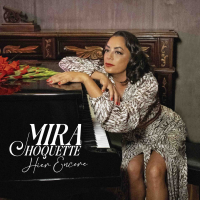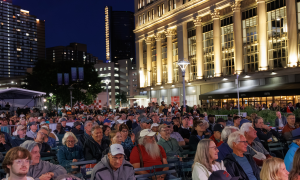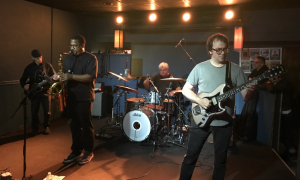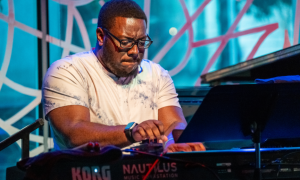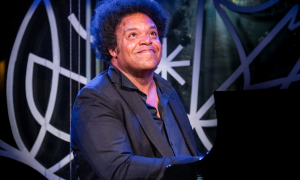Home » Jazz Articles » Live Review » Umbria Jazz Winter #18 Days 1-2: December 29-30, 2010
Umbria Jazz Winter #18 Days 1-2: December 29-30, 2010
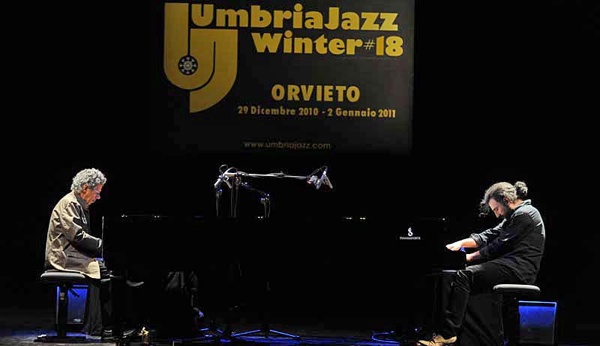
Umbria Jazz Winter #18
Orvieto, Italy
December 29, 2010-January 2, 2011
Chick Corea/Stefano Bollani Piano Duo
This year the wintery version of Italy's major jazz festival is an 18-year-old grown-up, and it shows. Its calendar reconfirmed a highly diverse mix, embellished by an increasing number of collaborations between North American, Latin and European jazz musicians.
The opening concert of this kermesse was a pearl of these heterogeneous artistic projects, one of a three concert series starring

Chick Corea
piano1941 - 2021

Stefano Bollani
pianob.1972
From the very first notes of

Antonio Carlos Jobim
piano1927 - 1994
In an evening repertoire intertwining Brazilian classics (including

Astrud Gilberto
vocals1940 - 2023
As Corea pointed out in the backstage, one of the most interesting definitions of aesthetics links the philosophical concept to both physical and emotional pleasure. A similar standpoint was particularly evident in the naturally pleasurable equilibrium of the different, yet perfectly balanced, ballets of dynamics displayed by these two pianists. Both musicians even mockingly referred to the mirror-like nature of their interpretations, when Corea showed the audience a score that a smiling Bollani argued to play sideways.
Dee Alexander's Evolution Ensemble
The morning of the second day in Orvieto started with a very peculiar reminder that women in jazz are a leading force. Dee Alexander, with her Evolution Ensemble, (featuring violinist James Sanders, bassist Junius Paul, drummer Yussef Ernie Adams and cellist Tomeka Reid —with whom Alexander also shares a place inside the AACM) opened the morning with a brilliantly vital performance.

As movingly highlighted by Alexander's comments throughout the whole concert, the aim was to present a series of compositions by Chicago-based jazz musician and composer "Light" Henry Huff, a key mentor and inspiring figure in the singer's life, who prematurely died in 1993. The tribute, far from assuming the mournful tones of a musical eulogy, introduced the Italian audience to the bubbly and up-tempo nature of Huff's canon, including "Live," "Happiness" and "Truth Will Set You Free."
Alexander's voice showed all its majestic range. She moved from a cocorito-like trill to the delicate pianissimo of an opera specialist, to the syncopated changes of rhythm of an experienced scat singer. Around her, Sanders swiftly accompanied her with violin variations of a definite Latin matrix, while Reid and Paul skillfully alternated pizzicatos and bowed, long-held notes. Adams enriched the whole with passing from the metallic sonorities of the wind chimes to the wooden ones of the drumsticks, which proved particularly evocative of nature's sounds in "Spring Thing."
Towards the end, an extremely moving composition by Alexander, "See You on the Other Side," was filled with her heartfelt gratitude towards Light, who taught her "how to use my voice as an instrument, the way I was meant to."
Danilo Rea, A Tribute to Fabrizio De AndrЁҰ

Danilo Rea
pianoRea's tribute, previously recorded during a session at Schloss Elmau— Piano Works X: Danilo Rea at Schloss Elmau, A Tribute to Fabrizio De AndrЁҰ (ACT, 2010)—embraced and highlighted both these characteristics from De AndrЁҰ's canon, without failing to welcome the audience with the pianist's own identifiable syntax. Rea, in fact, exploited the lowest notes on the piano with rare skillfulness, and his instrument, raptured in sumptuous crescendos, almost acquired the sound of a Cathedral's organ.

Danilo Rea
Rea's style constantly reminded the audience that playing the piano is a physical act, though he never overdid his climaxes. Equally, he often surprised his listeners with the delicacy of his dreamy pianissimos, as in "Canzone di Marinella," De AndrЁҰ's melancholic song dedicated to a youth beauty, found dead in a river during the spring time. Rea's arrangements and passionate interpretations faithfully reproduced, on the piano, the palette of emotional textures which dominate De AndrЁҰ's songs, giving shape to a memorable piano solo.
Joe Locke/Dado Moroni/Rosario Giuliani: Stepping on Stars
One of the most interesting aspects of Umbria Jazz (both summer and winter editions) is that it becomes the theatre of original project which mix musicians from highly different backgrounds. Most of the times these formations end up with fostered friendships, and in some cases they sparkle into ongoing collaborations and innovative recordings.
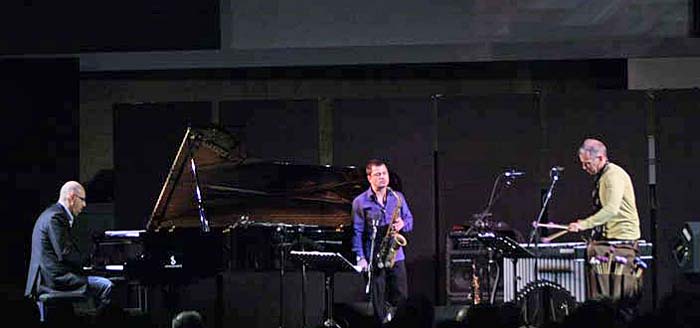
From left: Dado Moroni, Rosario Giuliani, Joe Locke
This is what happened with saxophonist

Rosario Giuliani
saxophone, alto
Joe Locke
vibraphoneb.1959

Dado Moroni
pianob.1962
The trio's performance at Umbria Jazz Winter followed the same pattern, enriched by live variations stemming from an atmosphere of joy and friendship which ran throughout the show. In "My Angel," the peculiarly liquid nature of Giuliani's alto sound was heightened by Locke's and Moroni's pianissimos. Giuliani just won Musica Jazz's readers' poll as best saxophonist, and each of his phrases confirmed his public's high expectations.
On the other hand, "Brother Alfred"—Moroni's composition dedicated to

McCoy Tyner
piano1938 - 2020

Thelonious Monk
piano1917 - 1982
Locke's "Sword of Whispers," a tribute to

Jimmy Scott
vocals1925 - 2014
Photo Credit
Courtesy of Umbria Jazz Winter
Days 1-2 | Days 3-5
Tags
Umbria Jazz Winter
Live Reviews
Sara Villa
Chick Corea
Stefano Bollani
Antonio Carlos Jobim'
Astrud Gilberto
Danilo Rea
Rosario Giuliani
Joe Locke
Dado Moroni
McCoy Tyner
Thelonious Monk
Jimmy Scott
Comments
PREVIOUS / NEXT
Support All About Jazz
 All About Jazz has been a pillar of jazz since 1995, championing it as an art form and, more importantly, supporting the musicians who make it. Our enduring commitment has made "AAJ" one of the most culturally important websites of its kind, read by hundreds of thousands of fans, musicians and industry figures every month.
All About Jazz has been a pillar of jazz since 1995, championing it as an art form and, more importantly, supporting the musicians who make it. Our enduring commitment has made "AAJ" one of the most culturally important websites of its kind, read by hundreds of thousands of fans, musicians and industry figures every month.

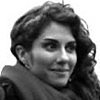
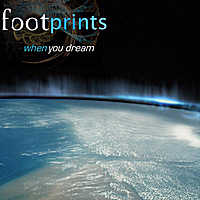


 Buy Now
Buy Now



